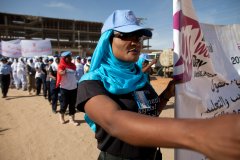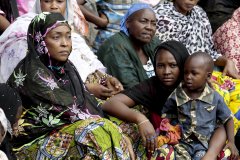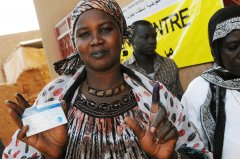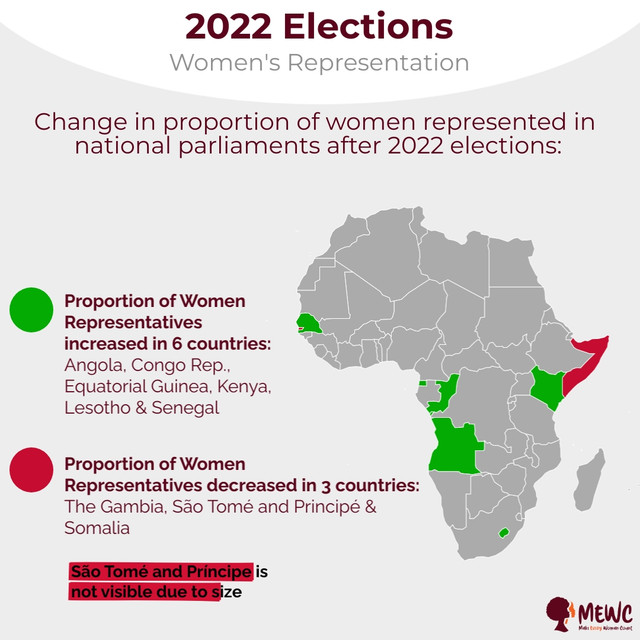Gender Issues Showlist
Women, Peace & Security
UNSCR 1325 calls on all parties to: protect and respect the rights of women and girls in conflict & post-conflict; increase women participation in all conflict resolution, peacekeeping and peace-building & to end impunity by prosecuting perpetrators of sexual and other violence on women and girls
index.php?option=com_content&view=category&id=56&Itemid=1913
Human Rights of Women
Thirty six years after the adoption of CEDAW, many women and girls still do not have equal opportunities to realize rights recognized by law. Women are denied the right to own property or inherit land. They face social exclusion, “honor killings”, FGM, trafficking, restricted mobility, early marriage,...
index.php?option=com_content&view=category&id=44&Itemid=1908
Violence Against Women
Violence against women is the most shameful human rights violation. Gender based violence not only violates human rights, but also hampers productivity, reduces human capital and undermines economic growth. It is estimated that up to 70 per cent of women experience violence in their lifetime
index.php?option=com_content&view=category&id=69&Itemid=1912
Political Participation & Leadership
Where women are fully represented, societies are more peaceful and stable. Women political participation is fundamental for gender equality and their representation in positions of leadership must be a priority for all Africans governments.
index.php?option=com_content&view=category&id=65&Itemid=1911
Latest News
- COTE D'IVOIRE: South-South Meeting to Promote Gender Equality and Combat Deforestation
- RWANDA: Rwanda Set to Launch Cervical Cancer Elimination Plan
- NIGERIA: Over 5,000 Nigerian Women Stranded in Iraq - Govt
- SUDAN: Healthcare Collapse Threatens Pregnant Women in Sudan's Sharg El Nil
- GHANA: President Nominates 12 More Ministers
- Senegal: Parliamentary election 2024
- Mauritius: Parliamentary election 2024
- Ghana: Presidential and Parliamentary Elections
- Botswana: Parliamentary elections 2024
- Algeria: Presidential Election 2024
GHANA: Memia Must Say No to Violence
Source: allAFrica.com
The 1992 Constitution spells out fundamental human rights and freedoms for all citizens and specifically provides for rights to equality and freedom from discrimination.
Often times in Ghana, women are subjected to discriminatory cultural practices that occasionally expose them to some of the violent tendencies of their male counterparts. At the workplace, they often find themselves in a similar atmosphere of abuse including sexual harassment and verbal abuse.
This leaves psychological scars that are as damaging as physical abuse.
Recently, the Ghanaian media has been flooded with reports of abuse of women in our higher educational institutions, where one would have thought that high level of civility and respect for human rights would be upheld.
A classic case in point is the recent incident involving Amina who was alleged to have stolen a mobile phone at the Mensah Sarbah Hall of the University of Ghana. She was physically and sexually assaulted by some of the male occupants whilst onlookers recorded the assault with their mobile phones which they later uploaded on social media.
This incident was not taken lightly by gender advocates who called on the university authorities to institute an investigation and bring the culprits to justice.
Efforts to eradicate violence against women in Ghana have been met with lots of impediments; principal amongst them is attitudes, beliefs and cultural practices which place men high above women and also overlook certain violent actions perpetuated against women.
Statistics available at the United Nations have it that 28% of males and 41% of females in Ghana between the ages of 15-19 still think that the husband is justified in hitting or beating his wife under certain circumstances.
The Beijing Platform for Action requests all governments to promote research, collect and compile statistics relating to the prevalence of different forms of violence against women.
Ghana has ratified a number of international charters and conventions that seek to promote an end to violence against women. Beyond this, it has put together its roadmap to steer programs aimed at ensuring that women enjoy their fundamental human rights. This is evident in the passage of the Domestic Violence Bill into law by Parliament on 21st of February 2007.
Despite the challenges confronting the Domestic Violence and Victim Support Unit (DOVVSU) of the Ghana Police Service formerly known as the Women and Juvenile Unit, it is helping to address cases of abuse and violence against women and children.
Various women rights groups have taken up advocacy on ending domestic violence against women in Ghana.
The government and the business community need to strengthen their responsibilities by providing direct financial support to organizations working to end violence against women to assist victims and to expand their income generation options.
Without a reliable statistical data base relating to prevalence of different forms of violence against women, no scientific step can be taken against the practice. The government needs to show more commitment by ensuring that funds are committed in the national budget for domestic violence. DOVVSU and gender- rights organizations should be adequately supported and the implementation of the Domestic Violence Act should be duly monitored and evaluated on timely bases for proper evidence-based planning purposes.
The media over the years has proven to be a very reliable stakeholder in advocating for an end to violence against women.
It is necessary to follow a story through to the prosecution stage and let the public know the full consequences of abusing women.
On the occasion of the International Day for the Elimination of Violence against Women (25th of November) and the beginning of 16 Days of Activism against Gender-Based Violence, Public Agenda joins the call by the Vice President of the Ghana Journalists Association (GJA), Mr. Affail Monney, to media to join forces and say no to violence against women.





